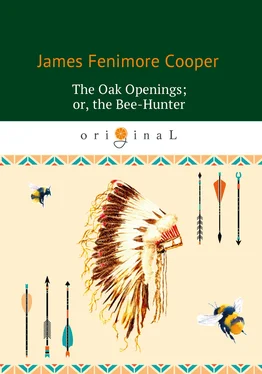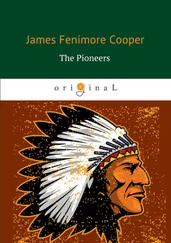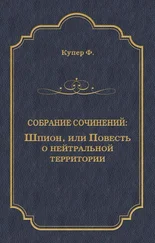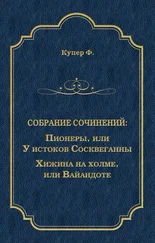After supping in company, our two adventurers secured everything; and, retiring to the chiente, they went to sleep. No material disturbance occurred, but the night passed in tranquillity; the bee-hunter merely experiencing some slight interruption to his slumbers, from the unusual circumstance of having a companion. One as long accustomed to be alone as himself would naturally submit to some such sensation, our habits getting so completely the mastery as often to supplant even nature.
The following morning the bee-hunter commenced his preparations for a change of residence. Had he not been discovered, it is probable that the news received from the Chippewa would not have induced him to abandon his present position, so early in the season; but he thought the risk of remaining was too great under all the circumstances. The Pottawattamie, in particular, was a subject of great distrust to him, and he believed it highly possible some of that old chief’s tribe might be after his scalp ere many suns had risen. Gershom acquiesced in these opinions, and, as soon as his brain was less under the influence of liquor than was common with him, he appeared to be quite happy in having it in his power to form a species of alliance, offensive and defensive, with a man of his own color and origin. Great harmony now prevailed between the two, Gershom improving vastly in all the better qualities, the instant his intellect and feelings got to be a little released from the thraldom of the jug. His own immediate store of whiskey was quite exhausted, and le Bourdon kept the place in which his own small stock of brandy was secured a profound secret. These glimmerings of returning intellect, and of reviving principles, are by no means unusual with the sot, thus proving that “so long as there is life, there is hope,” for the moral, as well as for the physical being. What was a little remarkable, Gershom grew less vulgar, even in his dialect, as he grew more sober, showing that in all respects he was becoming a greatly improved person.
The men were several hours in loading the canoe, not only all the stores and ammunition, but all the honey being transferred to it. The bee-hunter had managed to conceal his jug of brandy, reduced by this time to little more than a quart, within an empty powder-keg, into which he had crammed a beaverskin or two, that he had taken, as it might be incidentally, in the course of his rambles. At length everything was removed and stowed in its proper place, on board the capacious canoe, and Gershom expected an announcement on the part of Ben of his readiness to embark. But there still remained one duty to perform. The beehunter had killed a buck only the day before the opening of our narrative, and shouldering a quarter, he had left the remainder of the animal suspended from the branches of a tree, near the place where it had been shot and cleaned. As venison might be needed before they could reach the mouth of the river, Ben deemed it advisable that he and Gershom should go and bring in the remainder of the carcass. The men started on this undertaking accordingly, leaving the canoe about two in the afternoon.
The distance between the spot where the deer had been killed, and the chiente, was about three miles; which was the reason why the bee-hunter had not brought home the entire animal the day he killed it; the American woodsman often carrying his game great distances in preference to leaving it any length of time in the forest. In the latter case there is always danger from beasts of prey, which are drawn from afar by the scent of blood. Le Bourdon thought it possible they might now encounter wolves; though he had left the carcass of the deer so suspended as to place it beyond the reach of most of the animals of the wilderness. Each of the men, however, carried a rifle: and Hive was allowed to accompany them, by an act of grace on the part of his master.
For the first half-hour, nothing occurred out of the usual course of events. The bee-hunter had been conversing freely with his companion, who, he rejoiced to find, manifested far more common sense, not to say good sense, than he had previously shown; and from whom he was deriving information touching the number of vessels, and the other movements on the lakes, that he fancied might be of use to himself when he started for Detroit. While thus engaged, and when distant only a hundred rods from the place where he had left the venison, le Bourdon was suddenly struck with the movements of the dog. Instead of doubling on his own tracks, and scenting right and left, as was the animal’s wont, he was now advancing cautiously, with his head low, seemingly feeling his way with his nose, as if there was a strong taint in the wind.
“Sartain as my name is Gershom,” exclaimed Waring, just after he and Ben had come to a halt, in order to look around them – “yonder is an Injin! The crittur’ is seated at the foot of the large oak – hereaway, more to the right of the dog, and Hive has struck his scent. The fellow is asleep, with his rifle across his lap, and can’t have much dread of wolves or bears!”
“I see him,” answered le Bourdon, “and am as much surprised as grieved to find him there. It is a little remarkable that I should have so many visitors, just at this time, on my hunting-ground, when I never had any at all before yesterday. It gives a body an uncomfortable feeling, Waring, to live so much in a crowd! Well, well – I’m about to move, and it will matter little twenty-four hours hence.”
“The chap’s a Winnebago by his paint,” added Gershom – “but let’s go up and give him a call.”
The bee-hunter assented to this proposal, remarking, as they moved forward, that he did not think the stranger of the tribe just named; though he admitted that the use of paint was so general and loose among these warriors, as to render it difficult to decide.
“The crittur’ sleeps soundly!” exclaimed Gershom, stopping within ten yards of the Indian, to take another look at him.
“He’ll never awake,” put in the bee-hunter, solemnly – “the man is dead. See; there is blood on the side of his head, and a rifle-bullet has left its hole there.”
Even while speaking, the bee-hunter advanced, and raising a sort of shawl, that once had been used as an ornament, and which had last been thrown carelessly over the head of its late owner, he exposed the well-known features of Elks-foot, the Pottawattamie, who had left them little more than twentyfour hours before! The warrior had been shot by a rifle-bullet directly through the temple, and had been scalped. The powder had been taken from his horn, and the bullets from his pouch; but, beyond this, he had not been plundered. The body was carefully placed against a tree, in a sitting attitude, the rifle was laid across its legs, and there it had been left, in the centre of the openings, to become food for beasts of prey, and to have its bones bleached by the snows and the rains!
The bee-hunter shuddered, as he gazed at this fearful memorial of the violence against which even a wilderness could afford no sufficient protection. That Pigeonswing had slain his late fellow-guest, le Bourdon had no doubt, and he sickened at the thought. Although he had himself dreaded a good deal from the hostility of the Pottawattamie, he could have wished this deed undone. That there was a jealous distrust of each other between the two Indians had been sufficiently apparent; but the bee-hunter could not have imagined that it would so soon lead to results as terrible as these!
After examining the body, and noting the state of things around it, the men proceeded, deeply impressed with the necessity, not only of their speedy removal, but of their standing by each other in that remote region, now that violence had so clearly broken out among the tribes. The bee-hunter had taken a strong liking to the Chippewa, and he regretted so much the more to think that he had done this deed. It was true, that such a state of things might exist as to justify an Indian warrior, agreeably to his own notions, in taking the life of any one of a hostile tribe; but le Bourdon wished it had been otherwise. A man of gentle and peaceable disposition himself, though of a profoundly enthusiastic temperament in his own peculiar way, he had ever avoided those scenes of disorder and bloodshed, which are of so frequent occurrence in the forest and on the prairies; and this was actually the first instance in which he had ever beheld a human body that had fallen by human hands. Gershom had seen more of the peculiar life of the frontiers than his companion, in consequence of having lived so closely in contact with the “fire-water”; but even HE was greatly shocked with the suddenness and nature of the Pottawattamie’s end.
Читать дальше












